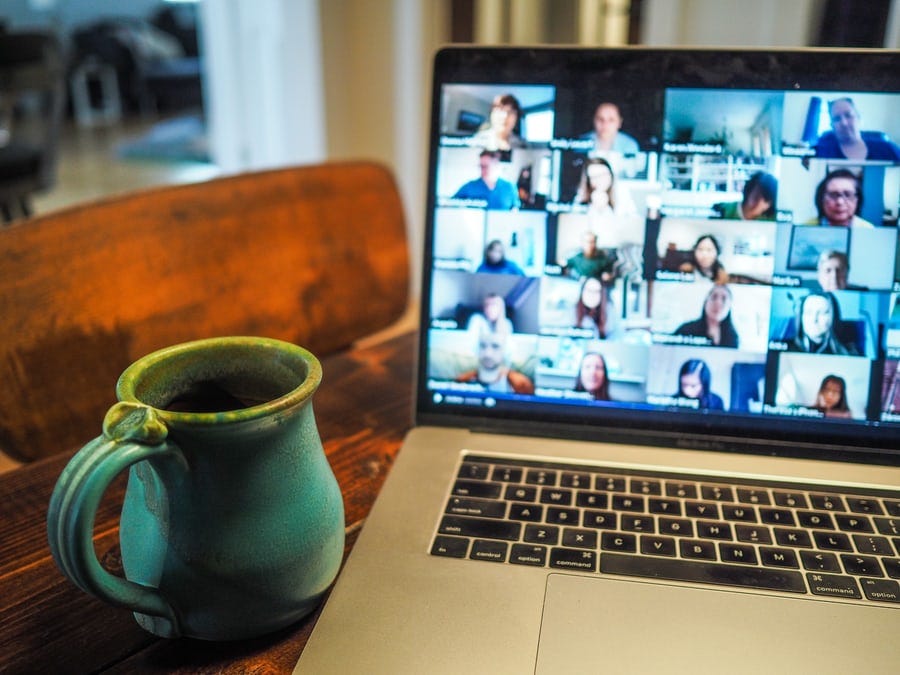A little more than 2 years ago, remote work seemed impossible for several industries. Zoom was unheard of and TikTok wasn’t ticking and taking up too much of our precious time.
Prior to the pandemic, 1 in 75 businesses offered a remote option. Now it’s 1 in 7 businesses.
Once Covid hit in March 2020, remote work wasn’t a choice, it was an obligation to keep businesses safe and continue operating. Since lockdowns began, VPNs got hooked, monitors got transported, and millions from the laptop class got down to work at a harder rapid pace to redeem their financial lives and reverse their company’s murky prospects amid the pandemic.
Yet slowly but surely, this unhealthy behavior and hustle culture workaholic lifestyle became a culprit of remote work. This is not to say working from home isn’t advantageous or helpful. In fact, I would say the benefits outweigh the costs, yet with no introduction and instead a sudden push into the makeshift bedroom, yoga studio, kids playroom home office, employees felt the pressure to work harder not necessarily smarter. After all, without moderation, shareholders may be cruising but the backbone may be bruising. This accelerated output from home benefited almost every sector, even ones that were ravaged by the pandemic but behind that hustle, remote workers have had mixed reviews on various fronts.
Alongside remote work, a few contributors massively bolstered industry growth:
-Monetary and fiscal stimulus -3 stimis and zero interest rates
-Remote work option-many workers felt pressurized to work more and tackle on more than usual
-Roaring stock market led to better financial positions for Americans, fewer evictions, and toxic debt ownership = inflationary and supply chain imbalances
Thanks to these benefits, at-home stocks such as Slack to Zoom soared until the vaccination rollout and pre-pandemic favorites such as Delta and Airbnb witnessed moderate profit growth due to pent-up demand, optimism on the horizon, excess liquidity pumped into the system, positive consumer sentiment, and rock bottom interest rates. The financial sector grew its cash reserves more than expected as mortgage borrowers took advantage of the hot housing market, paid off their dues, invested more, and a new wave of entrepreneurship was born.
Freedom to choose where and how one works was somewhat unheard of pre-pandemic. Now more Americans have adopted this Nordic philosophy of life, work-life balance > higher paycheck causing companies to raise wages, go on a hiring spree, and incentivize a more realistic lifestyle. At this point in the endemic, I’m finding remote workers are strongly polarized — they either want to stay or go pushed to the brink even at home. In the U.S. more than 4.3 million people work remotely. This accounts for 3.2% of the entire workforce who were also afforded the opportunity with less time and money constraints to tackle their financial hurdles and increase their passive income streams. Today, the remote work trend is continuing to rise as endless variants keep emerging and an endemic seems to be the prevailing situation but where does the line need to be drawn? Is hybrid the best solution? Will it make employees fulfilled, healthy, and the corporation’s balance sheets strong as well?

Balanced Keyboard
For those fortunate to be able to work from home, your earnings potential, family dynamics, mindset, health, and overall lifestyle must have changed, hopefully for the better. It cannot be mistaken that remote workers are also reporting high levels of mental illness, fatigue, burnout, and brain fog, especially if one has caught covid. We are dealing with two pandemics, a mental health crisis, and a lethal virus. Everyone has mixed reviews on ideal employment styles and where it can best be completed. I believe it is ultimately up to the employee themselves to decide how they can work. With more flexibility and choice, they will feel prouder and more excited about their work. We cannot take the genie out of the bottle. We’ve witnessed both modes of working.
Remote work is here to stay. Although many industries prefer in-person for the rest of time, they cannot depend on it forever. There’s no doubt remote work is a lifesaver and employers should be accommodative. It saves time = money, cost, hardship, headache, reduces stress, adds flexibility, promotes financial flexibility and stability, nourishing rewards, and more ‘me’ time. Yet we cannot forget the remote world does not fulfill the basic human desires we all crave and need to survive. These include the chance to be heard, respected, comfortable through psychological comfort, and supported ideally done in-person.
Remote work to many is seen as a matter of convenience. If one went remote for the first time at the start of the pandemic, at the time they most likely lived nearby to work. In terms of the commute or eating out, it wouldn’t have been much of a convenience then for close enough employees and in sum, the remote work option wouldn’t have drastic differences compared to in-person. It seems location and money saved are the main drivers for remote work but even these factors don’t always add up.
Usually, it takes money to earn more and not everything for less is more enjoyable than experiences and activities that require money to be spent.
Let’s observe the most common reasons for remote work:
-No commute
-Healthier with better choices
-Exercise
-Stronger work-life balance
– Prioritize ‘working smarter not harder’ philosophy
-Educate and entertain yourself more
We are social creatures. Isolation is not in our DNA and cannot be dealt with for extended periods of time As with everything, moderation is key. As a result, money will be spent regardless somewhere. If it’s not on Chipotle, it’ll be on a meal-prep program. No commute, more furniture, vice versa. In order to combat the feeling of regret and severe mental illnesses while boosting productivity and efficiency, I believe a hybrid option for classes and employment is most beneficial for longevity, retention, happiness, stability, health, and creativity.

Time Saver
Out of all the benefits of remote work, there’s no doubt the commute is the greatest reliever. Not having to dress up, wash up, deal with traffic, wait for the train, avoid crowds, and the pain of rush hour are massive relievers. Personally I crave some craziness and difference but not 5 days a week.
The average commute time in the U.S. is 26 minutes each way, not including prep beforehand. It takes the average American roughly 20 minutes to get READY for work. In total, remote work removes ~52 mins per day.
On a grander scale, skipping the commute amounts to:
$155 per week (5 hours 10 minutes)
$620 per month (20 hours 40 minutes)
$7,440 per year (10 days 8 hours)
Right away, the savings are extremely appealing, but spending money on a way of life that worked for you beforehand and made you feel closer to your career is not an unwise choice. If it works for you, that’s all that matters.
In the age of the Great Realignment, all generations are evaluating how to get the most bang for their buck especially as inflation is at a 40 year high!
The classic fallacy around remote work is that it is simply easier, increases productivity in the long run, and is the best solution that works for those that have the option. As we’ve witnessed during the pandemic, short-term yes, long-term, not necessarily. Associating remote work with saving money isn’t wrong. It certainly is possible and works wonders but if it comes at the cost of your mental health, relationships, and productivity, spending money is here to heal. Time is spent no matter what. Might as well spend it on what’s best for you.
Before you tie your life to a working style, outside of it, make sure you are diversified within your investments and have at least 5 passive income streams to keep yourself afloat. This will reduce the pressure from needing to make the best decision. Plus if you’re really savvy, reinvest more into your business ventures and the market to reduce your tax liability.
Although time = money, we can’t always think this plainly when it comes to remote work. It’s not an equation, instead a lifestyle. We all have different uses for our wealth but one thing we can all agree on is that we don’t always spend it wisely or think about the ROI. Life must be enjoyed, including a career. This is the most opportune time to understand what type of flexibility you deserve in terms of housing, earnings potential, and transportation while the workforce provides it to you. I would urge you not to only go black or white. There’s rarely one right way especially when it comes to decisions that take up 80% of our waking hours.
Spending money and wasting time isn’t dangerous or terrible when there are free or easier alternatives. Money is meant to be spent after all and if it is treating you right and utilized in the best way possible, continue that commute and city living. If you don’t have this luxury and most people would prefer to spend less if they can anyways, take advantage of the dispersion of work but make sure you aren’t spending more on a new home! Changes in a lower-cost area of living can add up just as quick! We are past the industrial age where work was once centralized and needed to be done in a rigid unrealistic fashion. Make sure you have your money work for you not against you in an ideal workflow to reap the endless rewards and dividends.

